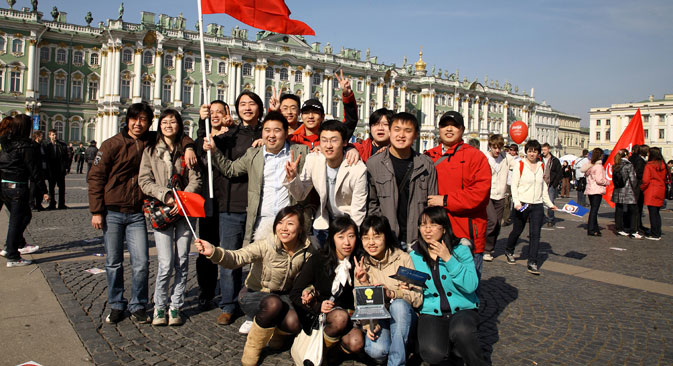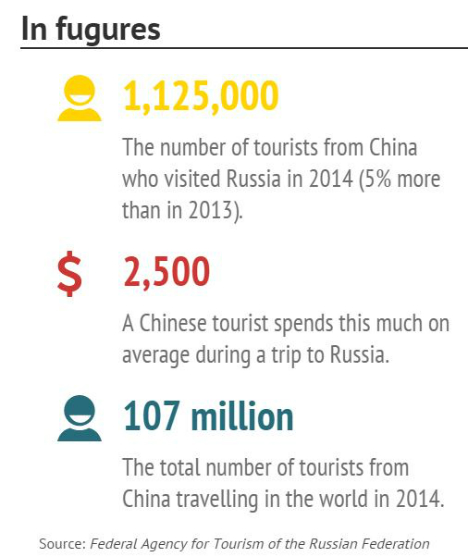
Chinese tourists taking pictures in front of the State Hermitage in St. Petersburg. Source: Photoxpress
Russia now receives more tourists from China than from any other nation: More than 1.1 million Chinese visited Russia in 2014, pushing Germany into second place.
"We expect that the volume of tourist traffic between China and Russia will be 5 million people – and we are confident that very soon we will be able to reach that figure," said Liu Jianming, head of the Chinese diplomatic mission for tourism, during his speech at the third Russian-Chinese Tourism Forum, which was held in Moscow on March 17.
Russia sees "huge potential" in the development of tourism from China. "We can increase the number of tourists several-fold," said Oleg Safonov, head of the Russia’s Federal Agency for Tourism. According to him, the development of tourism from China will be of great importance for the economy of the Far East, Siberia and the Trans-Baikal Territory.
In 2015, for the first time, three Russian agencies will open in China as a part of the Visit Russia federal project, Safonov said at the forum. The project will meet the challenges of promoting Russia and its regions and building a system of routes and logistics.
Remote regions
In order to show tourists the Russian regions, it is necessary to first solve the problem of infrastructure. According to Ivan Vvedensky, who heads the travel association World Without Borders, the majority of Chinese tourists today go to Moscow and St. Petersburg, which are both cultural and transportation centers. The regions remain on the sidelines due to their remoteness.
The Chinese party is seeking the organization of direct flights between the Chinese and Russian regions, Zhu Liang, general director of China Southern Airlines, said at the forum. According to Zhu Liang, it is a political issue that depends on the regional administrations.
"Regions should be ready to solve this issue at the local level," said Sergei Mstislavsky, sales director of the international company ATC AIR Services (Hong Kong).
According to Vvedensky, there are five or six strong regions in Russia that can afford to co-finance regional tourism development programs today.
Courting the Chinese
Tourists from China are attractive in the eyes of the world's business not only because of their number, but also because of their ability to pay. "Chinese tourists have become world leaders in spending on tourist trips,” said Anna Sibirkina, the project manager of China Friendly, speaking at the forum. In Russia, the average Chinese tourist spent 100,000 rubles in 2014 ($2,500 – according to the average exchange rate of the ruble in 2014).
According to Sibirkina, many countries are implementing special projects to attract tourists from China. Australia, for example, spends 25 percent of its marketing budget to attract Chinese visitors. The Russian certification system has recently joined the China Friendly International project.
According to Yury Polyakov, a member of the board of directors of TSUM (a central Moscow store selling luxury brands), 29 percent of purchases of luxury goods in the world are made by the Chinese. Russia could become a good luxury market for the Chinese, but the lack of a tax-free system in Russian legislation severely hinders the process.
"The introduction of this system will seriously promote tourism in Russia. But until that happens we will not have a boom like that in Europe," said Polyakov.

All rights reserved by Rossiyskaya Gazeta.
Subscribe
to our newsletter!
Get the week's best stories straight to your inbox